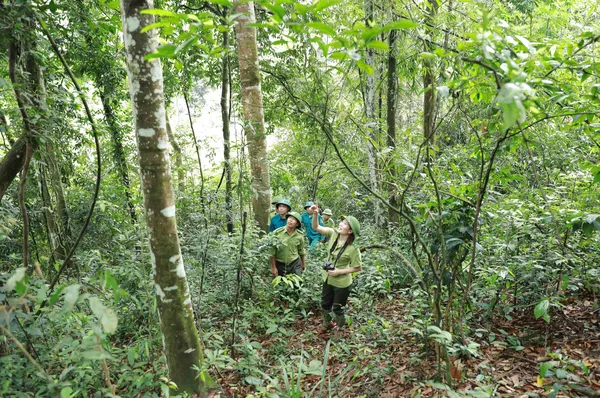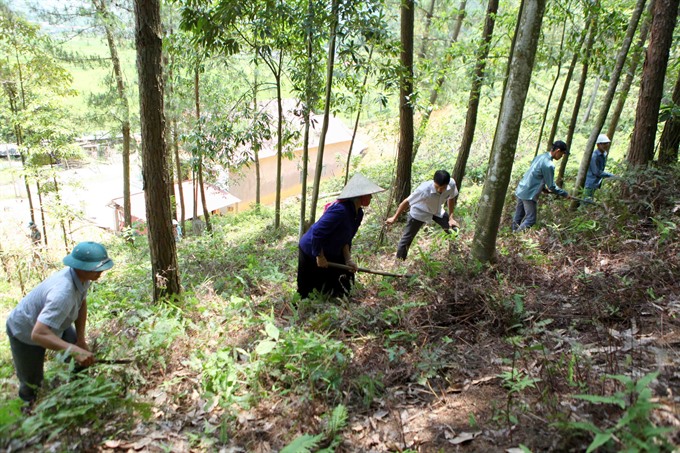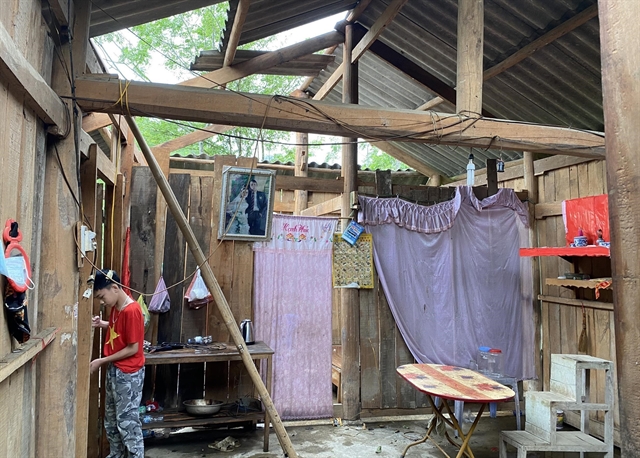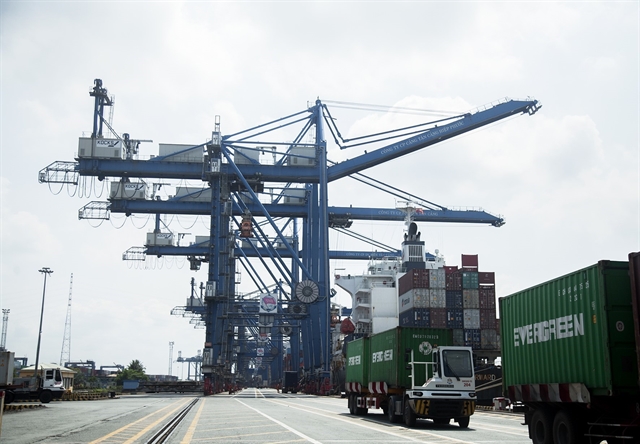 Environment
Environment

A number of provinces across the country including Lai Châu, Nghệ An and Tây Ninh are taking precautions to prevent forest fires as the dry season begins.
 |
| Residents from Than Uyên District in the northern mountainous province of Lai Châu cut wild plants to prevent forest fires in the dry season. — VNA/VNS Photo Công Tuyên |
HÀ NỘI — A number of provinces across the country including Lai Châu, Nghệ An and Tây Ninh are taking precautions to prevent forest fires as the dry season begins.
According to the Centre for Meteorological and Hydrological Forecasting, prolonged hot weather and droughts are likely to hit at the start of the year on a large scale, making the risk of forest fires is very high.
Vương Thế Mẫn, deputy chairman of People’s Committee of Than Uyên District in the northern mountainous province of Lai Châu, said the risk of forest fire was high at the end of January. At the time, people often used slash-and-burn cultivation practices - the main reason for forest fires.
To minimise the damage caused by forest fires in the dry season, the district had instructed local governments to review fire hot-spot and organise campaigns to raise awareness of forest fire prevention among local people, he said.
Officials had been sent to villages to talk to people, providing them with instructions on proper slash-and burn cultivation practices.
Dozens of teams had been set up in villages and hamlets to prepare for fire emergencies.
The fact that forest protection had been included in hương ước (village rules) had helped improve people’s awareness of the issue.
Điêu Văn Liền , party secretary of Nà Phát Village in Phúc Than Commune, which has the largest forest area in the district with nearly 3,000ha, said local authorities would deal with anyone who destroyed the forest in accordance with village rules.
Firstly, payments for forest environmental services would be deducted.
Then fines would be issued depending on the number of violations. The fine for the first violation would be VNĐ200,000 (US$8.6), VNĐ500,000 ($21.5) for the second and VNĐ1 million ($43) for the third.
However, Liền said most local residents followed village rules.
“No cases of forest fire or deforestation have been reported here over the past few years,” he said.
Lai Châu Province has more than 450,000ha of forests with a coverage ratio of nearly 50 per cent.
Nguyễn Văn Biển, head of Lai Châu Province’s Forest Protection Division, attributed the growth of forest areas to the efforts of local administrations in forest protection and fire prevention.
He also emphasised the effectiveness of getting the community involved in forest protection. Payments for forest environmental services have contributed to improving the lives of local residents while linking their benefits to effective fire prevention, he said.
In the central province of Nghệ An, the provincial People’s Committee has issued an instruction requesting heads of departments and agencies as well as the chairmen of districts to adopt measures to prevent forest fires.
A hotline has also been set up so local residents can inform authorities of violations and fires.
Tây Ninh Province near HCM City has taken a number of measures to prevent forest fires during the ongoing dry season.
At the beginning of the season the steering committee of the province’s target programme for sustainable forest development apprised relevant agencies, local authorities and farmers tending forests about the measures.
The steering committee regularly inspects and tells the farmers to identify places that are at high risk of forest fires and adopt preventive measures like cutting grass and other vegetation, controlling burning of vegetation and making firebreaks in forests along the border with Cambodia and in places where fires can engulf a large area.
The province has instructed farmers and local authorities to raise awareness of preventing forest fires and set up more protection stations at entrances to forests.
The stations are meant to keep people from entering to harvest firewood and honey, graze animals and burn dried grass.
The dry season usually runs from December to April.
Tạ Văn Đáo, deputy head of the steering committee, said the Lò Gò – Xa Mát National Park, Chàng Riệc historical and cultural forest, Dầu Tiếng protected forest, Bà Đen Mountain’s special use national forest, and forests in the border districts of Châu Thành and Bến Cầu have fire prevention plans in place.
They have also installed adequate firefighting facilities like water tankers, pumps and fire extinguishers and monitor their forests around the clock.
The Lò Gò – Xa Mát and Dầu Tiếng, which normally suffer forest fires in the dry season, have built three more 33m-high watch towers.
Tây Ninh has more than 70,000ha of canopy comprising special use forests, protected forests and forests grown to harvest timber. Most are situated on the Cambodia border. — VNS









